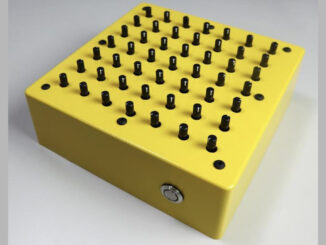Soma Labs LYRA-4, the younger sister of the LYRA-8 organismic drone Synthesizer, is back in a new compact and lighter version.
The Soma Labs LYRA-8 is a very popular drone Synthesizer among musicians. Due to its popularity, the drone synth has managed to cross the experimental scene into the mainstream synth market. I don’t know of any other drone synth that has done this. Impressive achievement.
Soma Labs also decoupled the concept of the organism synth in a smaller, more accessible version called LYRA-4 back in 2016. This disappeared from the market but is now back in a new version.
Soma Labs LYRA-4
Lyra-4 is a 4-voice analog organismic drone Synthesizer based on the same circuit design as the first version. The feature set is also identical, but the packaging is new.
Soma Labs says it’s smaller and lighter (1.2kg) but is equally rugged in design like the OG. This makes it easy to fit in a backpack and is perfect for taking the LYRA sound on the road.
Like the initial LYRA4, the new version is also inspired by the mechanism of tone generators of old electronic organs. The voices are divided into two pairs (12, 34), creating a tree-like structure.
They can function either in an electric organ mode or in an FM synthesis mode, with each voice and its envelope acting as a separate FM operator. The voice’s impact on FM synthesis will decrease along with the decay of its envelope.
Then, Soma Labs LYRA-4 features the hyper LFO, a complex low-frequency oscillator that generates waveforms from two simple LFOs by summating or multiplying their frequencies. It also offers a sync mode that can modulate the selected pairs of voices and the built-in mod delay.
Yes, the modulation delay is also onboard. It consists of a delay with feedback and a unique ability to self-modulate the delay sample rate using the output signal.
Further, it has a distortion unit, the last part in the chain after the delay. This original signal path makes possible that the delay can also influence the distortion.
Connectivity
A look at the back. Here, you find a power on/off switch, a DC 12V power supply input, CV voices and CV delay sockets, a main output, and a headphone socket.
Soma Labs promises that LYRA-4’s output dynamics and frequency response are balanced and ready for a live performance or studio recording.
First Impression
It’s nice to see that the Soma Labs LYRA-4 is returning to the market. It’s especially interesting for beginners who want to slowly get used to the Soma Labs and the fascinating LYRA drone world. But also if you want something more compact and portable.
Soma Labs LYRA-4 is available now only from the European production division for 360€ (ex VAT, shipping…) or in a set of two LYRA-4s for a special launch price of 580€ (ex VAT, shipping…).
More information here: Soma Labs






Be the first to comment